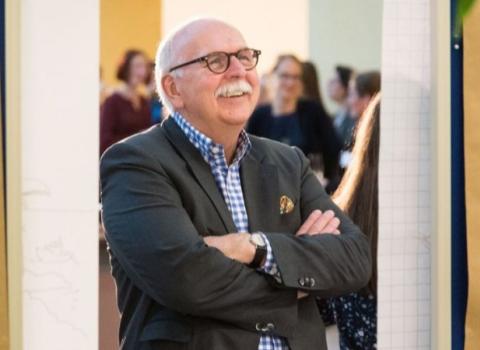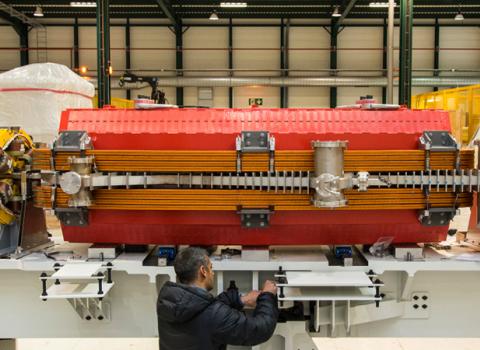A European project to create a new digital twin of Planet Earth will forecast global reactions to changing climate variables. But the UK and Switzerland, despite contributing to plans for the project, may be left out.

Photo: ESA
An ambitious EU initiative aiming to create a cyber-replica of Planet Earth for climate-impact simulations may not include British or Swiss organisations – and some researchers in the project say that’s a problem.
The Destination Earth project is a collaborative effort among the European Commission, the European Space Agency (ESA), the European Centre for Medium Range Weather Forecasts (ECMWF) and the European Organisation for the Exploitation of Meteorological Satellites (EUMETSAT). But even though the UK and Switzerland are members of ESA, ECMWF and EUMETSAT, they are not eligible to take part under current rules, a Commission official confirms.
That’s a problem for the project, some researchers say. “Switzerland is not eligible at the moment. This is very unfortunate as Switzerland has a very strong cyberscience community. They have some of the leading scientists in the world in terms of this very high resolution science,” says Pekka Manninen, director of the LUMI Leadership Computing Facility at the CSC IT Centre for Science in Finland.
At issue is continuing trade disputes that the UK and Switzerland are having with the EU – and which has resulted in their researchers being excluded from all new EU research projects in strategic areas such as high performance computing, quantum and space. Destination Earth will be funded primarily by the EU’s Digital Europe programme to the tune of €150 million with an additional €55 million coming from Horizon Europe. In accordance with Commission rules, the funding is open only to EU member states and associated countries, and the UK and Switzerland have neither status at present.
This comes even though Swiss researchers in particular helped to develop the strategy for the Destination Earth concept. In 2020, a team of Swiss researchers successfully applied supercomputing to yield ultra-high-resolution climate simulations covering all of Europe and the central Atlantic Ocean.
‘All is lost’
“It’s a problem for all Member States,” says Thomas Schulthess, professor of computational physics and director of the Swiss National Supercomputing Center (CSCS). “The member states should care about the loss of expertise and knowledge. Switzerland has been doing work like this for more than ten years. The know-how that we have, the people who were involved in writing the strategy for Destination Earth, is all lost.”
Francisco Doblas, director of the earth sciences department at the Barcelona Supercomputing Center, agreed that excluding UK and Swiss scientists from the Destination Earth project is a mistake.
“Many British colleagues are very interested in what is happening and fully supportive of it. It's obvious to me that these colleagues would have lots to bring in should the UK decide to join in. As for Switzerland, the particular skills in high-performance computing and environmental modelling and analysis of the Swiss institutions would be a very useful addition to Destination Earth,” he said.
Similarly, the UK are currently blocked from taking part in the Copernicus earth-observation project, but Nicolas Hanowski, head of mission management and ground systems at ESA, says that negotiations are ongoing between the UK, the EU and ESA to try to facilitate an agreement to ensure UK participation. He doesn’t rule out a similar scenario for Destination Earth in the future.
The project objectives
The goal of Destination Earth is to create two digital twins of the entire Planet Earth, taking into account every chemical, physical and biological variable, in order to predict how the planet will react to changes in the future.
The new digital twins will enable researchers to simulate how the planet will react to a variety of scenarios. While one will focus on weather-induced and geophysical hazards, the other will be used for testing out the effectiveness of new climate mitigation and adaptation methods like planting trees.
“We can use this information for political decision making because we can find out what activities are efficient for combating climate change,” says Manninen of CSC. “Alongside traditional climate simulations, you can see what-if scenarios. What if we cut down emissions, what happens, which parts are warming and which parts are cooling? What happens when we have heat waves? In the cities, in the forests, what happens for fisheries or what happens for African areas?”
High performance computing skills will be needed to develop the ambitious project, which is so complex that it will take until 2030 before it is finally complete. To give an idea of the scale of the project and the power required, if the global climate simulation runs for one day on a supercomputer, it would require 2700 years to run on a laptop.
The different specialisations of ESA, EUMETSAT and ECMWF will complement each other to ensure the success of the project, Hanowski of ESA says. Various existing initiatives will also run in synergy with the new Destination Earth system – such as Copernicus.
“This is one of the main reasons that we are working on the core platform,” says Hanowski. “We have already developed a number of these complex platforms, and our current activities are being adapted so that they can feed into Destination Earth. We will be very much profiting from Copernicus.”
The tasks have been spread out amongst the partners. ESA is focusing on the core platform. The ‘data lake’, essentially a database of relevant pre-existing data from a variety of sources, will be coordinated by EUMETSAT. The construction of the two digital twins will be the domain of ECMWF.
A note from Stick to Science: This shows that it is important to find a rapid solution for Switzerland and the UK so that their expertise could be brought back into the project as soon as possible. The signatories of the Stick to Science campaign are urging the European Commission, the UK and Swiss governments for a prompt association of Switzerland and the UK to Horizon Europe.










 A unique international forum for public research organisations and companies to connect their external engagement with strategic interests around their R&D system.
A unique international forum for public research organisations and companies to connect their external engagement with strategic interests around their R&D system.